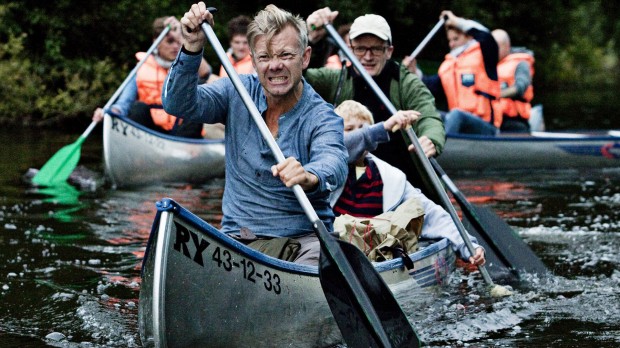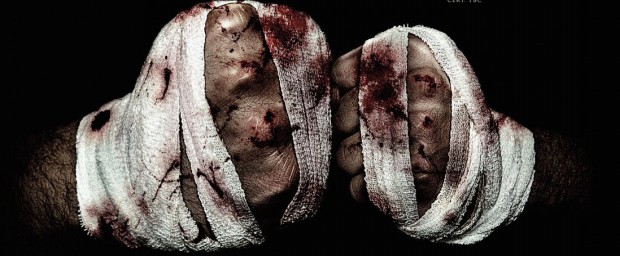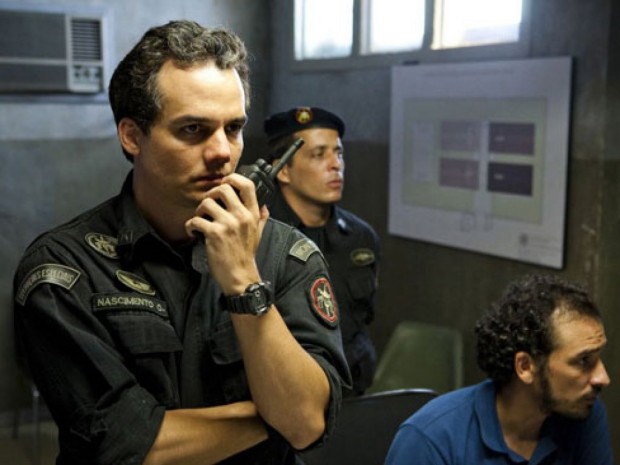
I may no longer be in Austin enjoying Fantastic Fest, but it doesn’t mean my movie watching stops. On Monday I did some catching up thanks to screeners and finally got to one of the more buzzed films at the festival: Clown (or Klovn: The Movie). Now, the film has absolutely nothing to do with face paint and big shoes, but it does feature a buffoon. This Danish road trip comedy stands out at Fantastic Fest because it is a straight comedy without any genre elements, but that’s the beauty of this festival. Not everything is necessarily genre, and the programmers pick whatever they feel strongly about. Anyways, let’s get back to the film.
Clown follows Frank and Casper, two long-time friends that are preparing for a wild canoe getaway from their female companions to go on a “Tour de Pussy.” However, when Frank is stuck with his brother-in-law’s 11-year-old son Bo, he takes the opportunity to prove he has father potential to impress his pregnant girlfriend and reassure her of his abilities. Unfortunately for him, those abilities are severely lacking and the trip turns into anything but smooth sailing. This hilarious film gives plenty of awkward moments that many have called a mix between Curb Your Enthusiasm and other buddy films where things go wildly off the rails with European comedy sensibilities worked in.
Frank is adorably daft and at times downright gullible. However, he has his own ideas and sometimes, against his better judgment earlier, will go through with his terrible plans. The film starts off quickly with vulgar humor and continues down that path throughout. Nothing is gross-out humor, but more salty language and adult situations….with an 11-year-old in close proximity. Most of the time the comedy is situational, as Frank rarely has a backbone which leads him to make poor choices while Casper is focused on getting laid as much as possible. Clown does an impressive job at feeling like a sweet film instead of just a raunchy cringe-inducing awkward comedy that it could have been. Of course, it gets to its conclusion in the worst ways possible, to our benefit.
Knuckle is a documentary about warring Travelers in Ireland that focuses on James Quinn McDonagh. Sometimes known as gypsies, these nomadic people have feuds that are often settled in the most alpha-male way possible: bare-knuckle fighting. Filmed by Ian Palmer, the documentary spans over a decade in the life of James who has an undefeated mark and is the leader of the pack. However, as hard-nosed and brutal as the fights are, James has a softer side that is uncovered by the film. Despite the feuds between the families that are often blood relatives within a generation or two, he maintains that he only fights when challenged and pushed into it. Unfortunately, the male ego and family pride are powerful forces and the clashes continue to occur.
The documentary is upsetting at times because most of this seems like senseless violence. The goal is that the families settle their differences mano-a-mano, but it seems to only fill a gap of time before more organized fights occur. Perhaps the most surprising aspect of the film are the fights themselves. The entire affair leaves you with your stomach in your mouth as every punch caused me to cringe, but there is an organization to them that keeps them from being street brawls. They don’t wrestle, and none of the competing families are allowed to attend otherwise things would quickly get out of hand. Instead, they pick two referees from other clans and have it in a neutral location. The options are being knocked out, simply admitting defeat, or having outsiders declare a draw. “Fair play” is the central theme to the fights, and for the most part things go down in a hospitable manner—for a fight. As a whole, the documentary is riveting and it explores a very secretive tradition and group and that’s why it’s one I would absolutely recommend it. While fighting is a theme throughout, it is James’ simultaneous lament for the tradition and adherence to it for familial pride that pulls you in and won’t let you go.
The final film of the day was José Padilha‘s Elite Squad: The Enemy Within. While you may immediately turn away when I tell you that this Brazilian political action thriller is a sequel, it doesn’t require seeing the first iteration to enjoy it. I was surprised by how well it actually allows you to jump right in, as I have yet to see the first either. Padilha did a great job of throwing you into the middle of a political warzone that is fictionalized but clearly struck a cord with Brazilian citizens when they turned out in droves to make his film the highest grossing in Brazil to date, beating out Dona Flor and Her Two Husbands and Avatar. With the announcement that the film will be Brazil’s entry for Best Foreign Language Film at the 84th Academy Awards, this has slowly become a film that is high on the radar of a lot of film enthusiasts with a planned November release in the U.S. All of that sets up the hype, and for me, the film genuinely lived up to it.
The film focuses on Roberto Nascimento, who is the head of BOPE (Batalhão de Operações Policiais Especiais), an elite squadron of special forces police similar to SWAT but with a more traditional military function as peacekeepers—or breakers—when necessary. A prison riot in Brazil spurs them into action and when they kill a gang leader, political hell breaks loose. Diogo Fraga, a political teacher in Brazil and now married to Nascimento’s ex-wife, calls for the dissolution of the elite squad that sparks political ramifications. Ousted from his spot as the head of BOPE, Nasimento decides to right his wrongs when he is promoted within the government and lands himself in a desk job. He cracks down on drug cartels and attempts to fight corruption, but nothing comes easily in Brazil. Backstabbing, corruption, assassinations, and more are all par for the course as many options and ideas are explored.
No stone seems left unturned and as the politicians, militias, and corrupt officers within Brazil put a stranglehold on the country, Nascimento continues to fight back with any means possible. He isn’t afraid to get his hands dirty, though he has a moral compass that keeps him from going over the edge. Main characters are disposable and the way the story unfolds feels eerily realistic and true to what can possibly occur in Brazil today. All of this combined with the focused cinematography, memorable score, and intelligent writing gives a dreary outlook on how hard it is to fight corruption when the system has been broken for decades.



